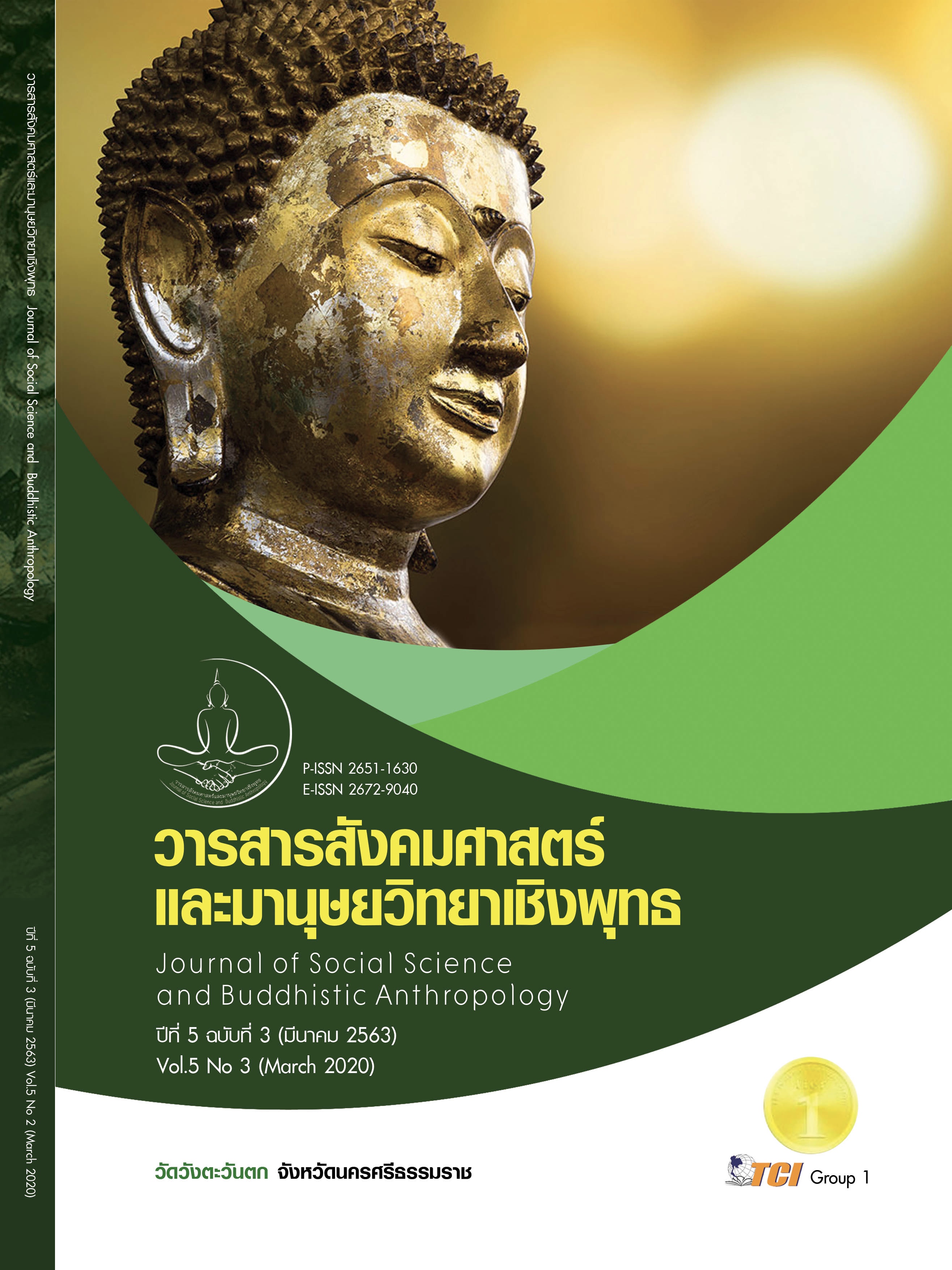A CAUSAL MODEL OF PREPARATION FOR AGING SOCIETY BASED ON BUDDHIST PSYCHOLOGY FOR MARKETING APPROACH IN THE NEXT DECADE
Keywords:
Causal Model, Aging Society, Buddhist Psychology, Marketing In The Next DecadeAbstract
The objectives of this dissertation were 1) to develop a casual model of preparation for aging society based on Buddhist psychology for marketing approach in the next decade; 2) to validate and propose a casual model of preparation for aging society based on Buddhist psychology for marketing approach in the next decade. Multi-phase mixed methods research using a quantitative method to extend qualitative results and EDFR technique of future research was used for research design. Content analysis and analytic induction were used for qualitative analysis. For quantitative data, descriptive statistics and correlation were analyzed by computer package. In addition, the validation of the model with empirical data, direct and indirect effects were analyzed by LISREL program. The research results were as follows: Validated result of a causal model of preparation for aging society based on Buddhist psychology for marketing approach in the next decade showed that developed model fit with empirical data with = 80.73, df = 68, p = .138, GFI = .980, AGFI = .960, RMSEA = .019, RMR = .022. Interesting result showed that characteristics of the elderly have indirect effect towards readiness of the elderly to enter the market in the next decade by having concept of Yonisomanasikara as a mediator. Result of the experts’ consensus on a causal model of preparation for aging society based on Buddhist psychology for marketing approach in the next decade using EDFR technique indicated that all items have been accepted the consensus from experts with interquartile range (Q3-Q1) less than 1.50, and the absolute of median and mode difference less than 1.00. Therefore, the developed model showed that the readiness of the elderly to entering the market in the next decade, with the principles of Yonisomanasikara and Kalyanamitra as a component will lead the elderly to be ready for Cosmic dimension (C), Self-Dimension (S), Social and personal relations dimension (S), Spiritual ability (S). It is a C3S model for Smart Aging that effect to mindset of the elderly in the next decade.
References
กมลาศ ภูวชนาธิพงศ์. (2557). กระบวนการปลูกฝังค่านิยมการบริโภคด้วยพุทธิปัญญาสำหรับวัยรุ่น. ใน ดุษฎีนิพนธ์พุทธศาสตรดุษฎีบัณฑิต สาขาวิชาพระพุทธศาสนา . มหาวิทยาลัยมหาจุฬาลงกรณราชวิทยาลัย.
จุมพล พูลภัทรชีวิน. (2540). การวิจัยอนาคตแบบ EDFR ในแบบแผนและเครื่องมือการวิจัยทางการศึกษา. กรุงเทพมหานคร: จุฬาลงกรณมหาวิทยาลัย.
จุมพล พูลภัทรชีวิน. (2551). การวิจัยอนาคต. วารสารสมาคมการวิจัย, 13(2), 9-13.
นโยบายและแผนระดับชาติว่าด้วยการพัฒนาดิจิทัลเพื่อเศรษฐกิจและสังคม (พ.ศ. 2561 - 2580). (2562). ราชกิจจานุเบกษา 136(47), 1.
พระพรหมคุณาภรณ์ (ป.อ. ปยุตฺโต). (2556). โยนิโสมนสิการ: วิธีคิดตามหลักพุทธธรรม. (พิมพ์ครั้งที่ 24). กรุงเทพมหานคร: ปัญญาประดิษฐาน.
พระมหาวรวรรธน์ นภภูสิริ (อัตถาพร). (2554). การศึกษาวิเคราะห์วิธีคิดแบบโยนิโสมนสิการ. ใน วิทยานิพนธ์พุทธศาสตรมหาบัณฑิต สาขาวิชาพระพุทธศาสนา. มหาวิทยาลัยมหาจุฬาลงกรณราชวิทยาลัย.
ร่างยุทธศาสตร์ชาติ ระยะ 20 ปี (2560 – 2579). (2560). ราชกิจจานุเบกษา 135(82), 1.
รุ่งลาวัลย์ ละอำคา. (2558). รูปแบบการเรียนการสอนโดยสร้างศรัทธาและโยนิโสมนสิการ: เส้นทางแห่งปัญญาเพื่อการพัฒนาครูและศิษย์. วารสารวิจัยเพื่อพัฒนาสังคมและชุมชน มหาวิทยาลัยราชภัฏมหาสารคาม, 2(2(4)), 19-28.
ลดารัตน์ สาภินันท์. (2545). ภาวะธรรมทัศน์ในวัยผู้สูงอายุและการเตรียมตัวเกี่ยวกับความตายของผู้สูงอายุ. ใน วิทยานิพนธ์พยาบาลศาสตรมหาบัณฑิต สาขาวิชาการพยาบาลผู้สูงอายุ. มหาวิทยาลัยเชียงใหม่.
ลำพอง กลมกูล. (2554). อิทธิพลของกระบวนการสะท้อนคิดต่อประสิทธิผลการวิจัยปฏิบัติการในชั้นเรียน: การวิจัยแบบผสมวิธี. ใน ดุษฎีนิพนธ์ครุศาสตรดุษฎีบัณฑิต สาขาวิชาวิจัยและจิตวิทยาการศึกษา. จุฬาลงกรณมหาวิทยาลัย.
วิทมา ธรรมเจริญ. (2555). อิทธิพลของปัจจัยภายนอกและปัจจัยภายในที่มีต่อความสุขของผู้สูงอายุ. ใน วิทยานิพนธ์วิทยาศาสตรมหาบัณฑิต สาขาวิชาสถิติประยุกต์. สถาบันบัณฑิตพัฒนบริหารศาสตร์.
สำนักงานสถิติแห่งชาติ. (2560). ผลสำรวจประชากรสูงอายุในประเทศไทย. เรียกใช้เมื่อ 23 มีนาคม 2563 จาก https://www.nso.go.th
อาชัญญา รัตนอุบล และคณะ. (2552). การศึกษาสภาพ ปัญหา ความต้องการ และรูปแบบการจัดกิจกรรมการศึกษานอกระบบและการศึกษาตามอัธยาศัย เพื่อส่งเสริมการเรียนรู้ด้านการเตรียมความพร้อมเมื่อเข้าสู่วัยผู้สูงอายุของผู้ใหญ่วัยแรงงาน. ใน ดุษฎีนิพนธ์ครุศาสตรดุษฎีบัณฑิต สาขาวิชาการศึกษานอกระบบโรงเรียน. จุฬาลงกรณมหาวิทยาลัย.
Joseph F Hair et al. (1998). Multivariate data analysis Upper Saddle River. New Jersey: Prentice Hall.
Lars Tornstam. (2005). Gerotranscendence: A Developmental Theory of Positive Aging. New York: Springer Publishing Company Inc.
Philip Kotler et al. (2016). Marketing 4.0 moving from traditional to digital. New Jersey: John Wiley & Sons Inc.
Rekettye Gábor. (2016). The effects of global trends on the future of marketing communications - an international perspective. In Doctoral Dissertation. University in Győr Hungary.









